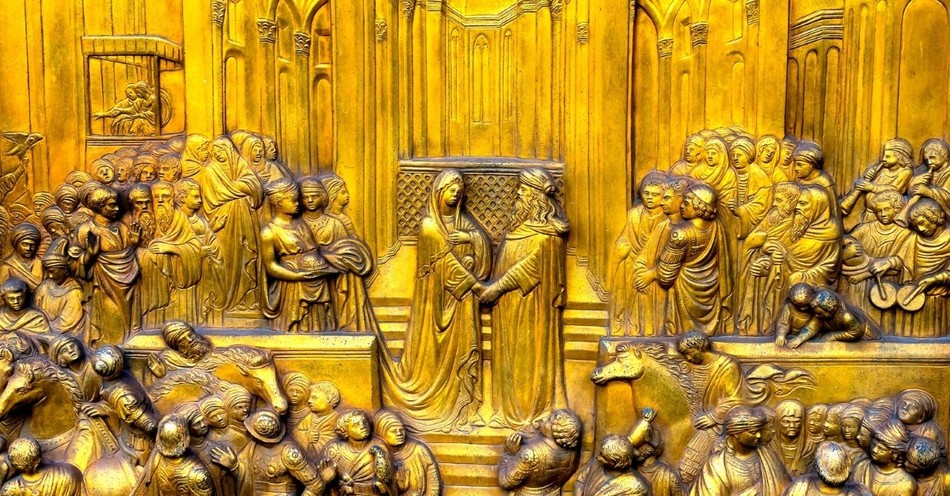The world seeks wisdom in academia, social leaders, politicians, organizations offering peace at all costs, psychics, the evening news, etc. It can be sold for pennies, but true wisdom is costly. Queen of Sheba, a wise woman in her own right, heard of King Solomon and set out to meet him. Her intentionality to seek wisdom from a godly source encourages all believers to reflect on their pursuit of true wisdom.
Where Do We See the Queen of Sheba in the Bible?
The Queen of Sheba is directly referred to in 1 Kings 10:1-2 and 2 Chronicles 9:1-13 and indirectly referred to as “queen of the south” in Matthew 12:4 and Luke 11:31.
In addition to her wisdom, she was also known to be inquisitive and a seeker of wisdom, honing her quick wit with riddles and knowledge. In The Antiquities of the Jews, prominent Jewish scholar and historian Flavius Josephus describes her as “inquisitive into philosophy and on that and on other accounts also was to be admired.”
Queen of Sheba and her entourage traveled a great distance (about 1,500 miles) to meet with King Solomon in Jerusalem. Intrigued by his popularity, her goal, according to 1 Kings 10:1, was to test him with hard questions and learn more about his relationship with God. As a queen, her questions also likely touched on moral and diplomatic matters.
Queen of Sheba’s gifts for Solomon were extravagant, reflecting the wealth of her kingdom. 1 Kings 10:10 states she brought 120 talents of gold (equaling almost 9,000 pounds), costly jewels, and a supply of spices that had never been witnessed before in Jerusalem.
The king answered every question, far exceeding her expectations. In return for her gifts, King Solomon gave her gifts and “every desire that she expressed” (1 Kings 10:13). Her visit could have lasted up to six months before the king sent her home with more than she brought. And with that, she returned home to Sheba, believed to be in present-day Yemen. The exact location of her kingdom is still a highly debated topic among commentators, as some believe she traveled from Ethiopia instead of Africa.
Queen of Sheba arrived in Jerusalem as a seeker, but there’s no evidence proving that she returned home as a believer in King Solomon’s God. In Matthew 12:42 and Luke 11:31, Jesus uses the Queen of Sheba, or “queen of the south,” as an example. She is a pagan but seeks wisdom by traveling “from the ends of the earth” to find a man of great wisdom. How much more should believers seek the One who defines wisdom, Jesus Christ?
What Do Extrabiblical Texts Say about the Queen of Sheba?
Queen of Sheba’s story is recorded in the Bible and in sacred texts to Jews and Muslims.
Although not mentioned by the same name, Queen Sheba appears in the Quran (Koran) as Bilqis, a queen Solomon believed worshipped the sun. This account describes Solomon sending a letter in hopes of convincing her to love his god. According to this narrative, Bilqis responded to the letter by sending gifts but eventually traveled to Jerusalem after receiving no response from the king. It’s unknown whether Bilqis married Solomon, but Muslim commentators believe she eventually became a believer.
Queen of Sheba is also a noted figure in the Kebra Nagast (“the Glory of Kings”), a foundational story in the Ethiopian Orthodox Church, as she is directly connected to the establishment of Ethiopia. In this account, she is known as Makeda, a queen from ancient Ethiopia who travels to meet King Solomon. Ethiopians elaborate on the visit by adding a love affair which later resulted in a son, Menelik, speculating that the Queen of Sheba was the nameless woman Solomon wrote about in Song of Solomon. According to the Kebra Nagast, Menelik travels to meet his father, King Solomon, as a young adult but later returns to Ethiopia with the Ark of the Covenant. The account falls outside the biblical canon but is worth noting because, according to this narrative, the son, Menelik, is considered part of the Davidic line as King Solomon’s son, making Ethiopian kings seen as divine rulers.
Josephus wrote in the late first century that the Queen of Sheba ruled Ethiopia and Egypt, known for its riches. He intended to persuade Roman readers that her visit to Solomon showed the king’s wide and well-known prominence—she ruled what later became the wealthiest province in the Roman Empire.
Why Was the Queen of Sheba So Impressed by Solomon?
Queen of Sheba was impressed by Solomon for many reasons, but based on 1 Kings 10:4-5, I believe the first to be his hospitality. The verses specifically mention the food on his table, the seating of the officials, attending robed servants and cupbearers, and the burnt offering he made at the temple.
1 Kings 10 describes how she was overwhelmed by what she saw. All the reports of King Solomon’s achievements and wisdom were accurate. Before, she had only heard of them, but now she saw everything with her own eyes and testified that the king’s wealth and wisdom far exceeded what she expected.
Josephus notes in Antiquities of the Jews that the Queen of Sheba’s appreciation for the king grew after seeing the preparation, skill, and sacrifices used daily in the temple.
Do We Know What Happened to the Queen of Sheba Afterward?
No other mention is made of the Queen of Sheba in the Bible after her return to Saba. There is so little evidence of her existence outside the biblical references that some question her reality. Some traditions claim she wasn’t a person but used only figuratively as “Queen of Sheba” in biblical accounts. Still, the legend of this powerful and intelligent woman has inspired movies, literature, and art throughout the years.
5 Lessons Learned from Queen of Sheba in the Bible
We can learn some important lessons from the encounter between the Queen of Sheba and King Solomon, such as:
1. Pursue wisdom and pursue Jesus Christ. A bride and groom say “I do” on the wedding day, but to cultivate a growing, fulfilling relationship, they continue to engage one another in conversation, date nights, etc. Similarly, believers must devote their hearts and soul to seeking the Lord, His wisdom, and guidance (1 Chronicles 22:19).
2. Seek wisdom in the counsel of wise counselors. Queen of Sheba traveled far to ask well-thought-out, even complex, questions of a king known for possessing God’s wisdom (Proverbs 11:14).
3. Live in such a way that God’s goodness is evident. We are ambassadors of Christ, and like King Solomon, our relationship with God is displayed (2 Corinthians 5:20).
4. Our obedience affects those around us. “How happy your people must be! How happy your officials, who continually stand before you and hear your wisdom!” (2 Chronicles 9:7)
5. There’s an eternal difference between knowing about God and knowing God. In 2 Chronicles 9:8, the Queen of Sheba praises God for delighting in King Solomon and placing him on the throne as King, but in context, there is no evidence of her allegiance to his God. It was most likely a polite gesture, recognizing the king’s God.
A Prayer to Seek Wisdom
Heavenly Father, please give me a hunger and thirst for Your wisdom. Worldly sources of wisdom leave me feeling empty, confused, and sometimes fearful, but You are sovereign, Lord, and nothing is hidden from Your sight. Thank You for giving me wisdom so abundantly when I ask for it. You delight in my asking, knowing wise decisions reflect Your love, mercy, and grace to seekers. Amen.
Photo Credit: Getty Images/bpperry.

This article is part of our Bible resource for understanding the significance and meaning of biblical phrases and ideas. Here are our most popular Bible articles to grow in your knowledge of God's Word:
Promises of God in the Bible
Is "This Too Shall Pass" in the Bible?
What Was the Ark of the Covenant?
Top 10 Bible Stories for Kids
“Iron Sharpens Iron” in Proverbs 27:17
"Fearfully and Wonderfully Made" in Psalm 139
“Be Still and Know That I am God” in Psalm 46:10
"No Weapon Formed Against Me Shall Prosper" - Isaiah 54:17



.jpg)